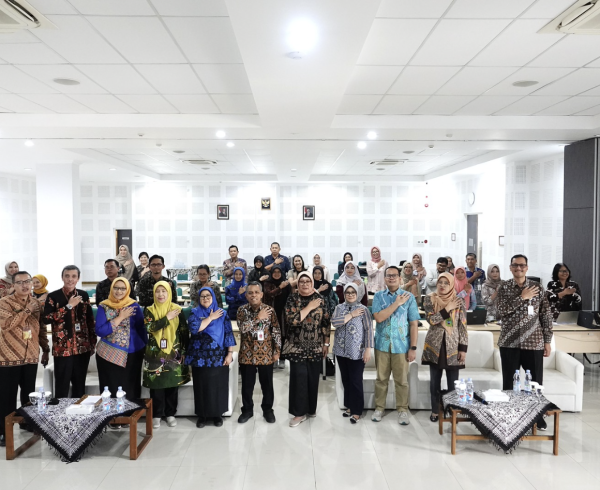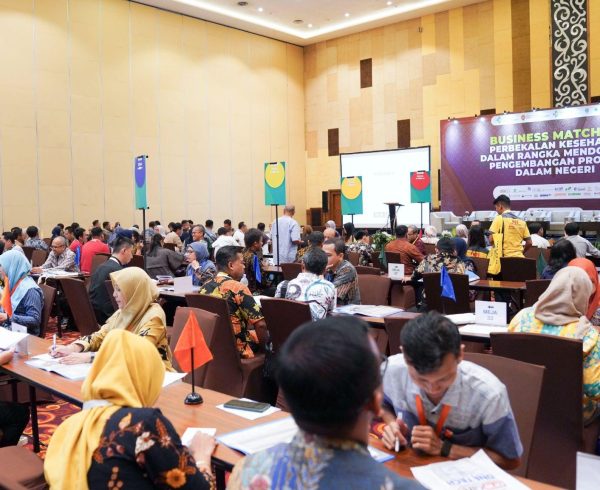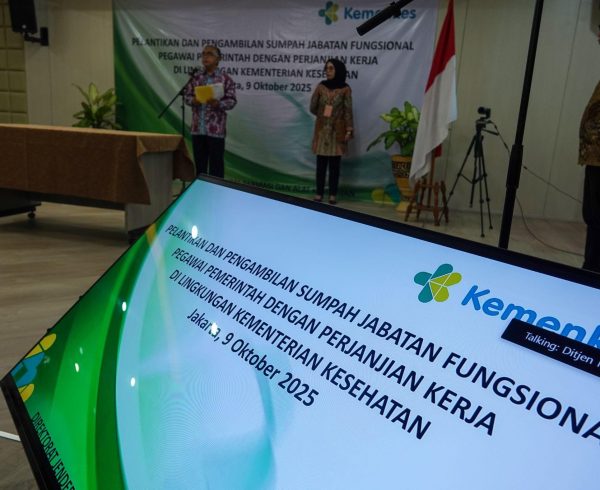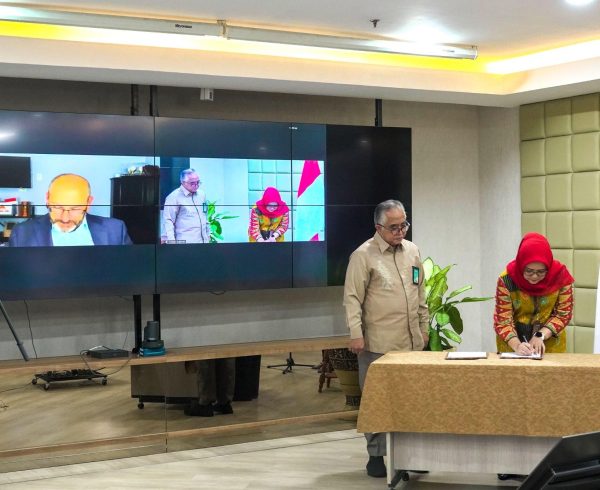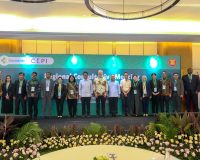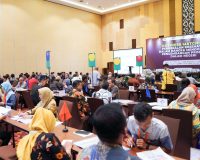“Health development for the 2020-2024 period is directed at improving health services towards universal health coverage, especially by strengthening primary health care by encouraging increased promotive and preventive efforts, and supported by innovation and technology utilization.”
Delivered by the Secretary General of the Ministry of Health - drg. Oscar Primadi, MPH (27/04/2021) at the National Coordination Meeting (RAKONAS) in the field of Pharmaceuticals and Medical Devices of the Eastern Regional Directorate General of Health which was attended virtually by 520 participants, consisting of managers of pharmaceutical and medical equipment programs and activities at province / regency / city health offices, pharmaceutical and medical equipment industry partners, as well as professional organizations, resource persons from various ministries / agencies, such as the Coordinating Ministry for Marvest, Coordinating Ministry for the Economy, Ministry of Home Affairs, LKPP, Kemenristek BRIN, BPOM, and cross-programs and officials within the Directorate General of Health.
The discussion and coordination of current health development cannot be separated from important matters such as RPJMN, handling the pandemic and Covid-19 vaccination, and health digitalization, several things that need to be followed up according to the Secretary General, among others, Health development for the 2020-2024 period is directed at improving health services towards universal health coverage, especially by strengthening basic health services (primary health care) by encouraging increased promotive and preventive efforts, and supported by innovation and technology utilization.
This grand theme will animate the implementation of strategies, national priorities, priority projects, and priority activities, which include 5 strategies namely: Improving maternal, child, family planning, and reproductive health; Accelerating improvements in community nutrition; Improving disease control; Acculturating the Healthy Living Community Movement; and, Strengthening health systems and drug and food control.
The Secretary General added, at the annual activity planning stage, as is currently being prepared for the Government Work Plan (RKP) Year 2022, the policy direction and strategy become a foundation that is sharpened with several major projects, one of which is Health System Reform. Of course, the urgency of implementing this reform has become even more apparent after we experienced the Covid-19 pandemic which really put pressure on the national health system.
“I would like to reiterate the President's direction, that the pandemic we are experiencing must be addressed as an opportunity to reform our health system,” said the Secretary General. Reforms must be a common concern, and become a direction that must be achieved together by the Ministry of Health and Provincial and Regency / City Health Offices.
The Government observes that efforts to deal with the pandemic need to be carried out more strictly, especially facing the long holiday period. Interventions to limit community activities face a big challenge as we enter the holiday period, which generally increases community mobility.
Based on more than a year of experience in the pandemic, holidays are generally followed by an increase in positive confirmed cases. The Ministry of Health noted that some provinces are already included in provinces with level 2 transmission confirmation cases (positive confirmation cases 20 - < 50 cases per 100,000 people per week) and level 3 (positive confirmation cases 50 - < 150 cases per 100,000 people per week). In addition, there was also an increase in vertical hospital bed occupancy in the period April 11-25, 2021. Of course, this signals to all of us to tighten pandemic control efforts in our respective regions.
As one of the game changers in handling the Covid-19 pandemic, the Ministry of Health together with the Provincial Health Office and Regency / City Health Office, and other components of the nation, organized vaccination efforts to accelerate the emergence of group immunity, thereby reducing the risk of transmission and severity when infected with the Covid-19 virus. This vaccination effort is carried out in 4 stages, taking into account the availability of vaccines at the national level.
Currently, phase 1 has been implemented for 1.46 million health workers, and is working hard to complete phase 2 vaccinations for 21.5 million elderly and 16.9 million public officials. The success of this vaccination requires careful logistics management, which is inseparable from the active role of each Health Office. With a good vaccination plan and effective logistics management, more targets will be reached in phase 3 and phase 4.
“We should be grateful, with our hard work to date, we have been able to fully vaccinate (2 doses) more than 11.7 million Indonesians, where our daily vaccination capacity can reach 500,000 people per day. We need to maintain this, so that it remains optimal to achieve the vaccination target of 181.5 million people by the end of 2021. Indonesia is also listed as one of the countries with the highest vaccination rate,” said the Secretary General.
However, it is emphasized that this should not make us complacent, and we need to immediately increase vaccination capacity with adequate vaccination logistics support. The current Covid-19 pandemic has encouraged us to develop new ways to provide the widest possible access to health services to the community. One of these ways is by digitizing health.
Mr. President's message is that it is necessary to accelerate digital transformation, and for that there are 5 things that must be done, namely: Improving digital infrastructure to expand internet access; Preparing digital transformation roadmaps in strategic sectors, such as government, public services, social assistance, education, health, trade, industry, and broadcasting; Accelerating the integration of national data centers; Human resources with digital talents; and, preparing regulations, funding schemes, and digital transformation financing.
As a form of the main focus of health digitalization, there are 5 things that can be the direction of development, so that digitalization can be realized.

The five focuses are telemedicine, e-pharmacy, electronic medical record, device innovation, and health information system. Telemedicine is the main service in the development of digital-based health services. In order to achieve a complete degree, telemedicine is accompanied by the implementation of e-pharmacy, which provides access to safe, quality, and efficacious medicines. All health records are securely stored in the electronic medical record, which can be accessed universally at any time. which can be accessed universally in every health facility. These health records include health information generated by health devices, which is personalized according to individual needs. At the macro level, the interaction between various foci is organized in a national health information system.
**humas_farmalkes2021



 drg. Oscar Primadi, MPH, Secretary General of the Ministry of Health at the National Coordination Meeting (RAKONAS) of Pharmaceuticals and Medical Devices of the Directorate General of Pharmaceuticals Eastern Region, April 27, 2021.
drg. Oscar Primadi, MPH, Secretary General of the Ministry of Health at the National Coordination Meeting (RAKONAS) of Pharmaceuticals and Medical Devices of the Directorate General of Pharmaceuticals Eastern Region, April 27, 2021.